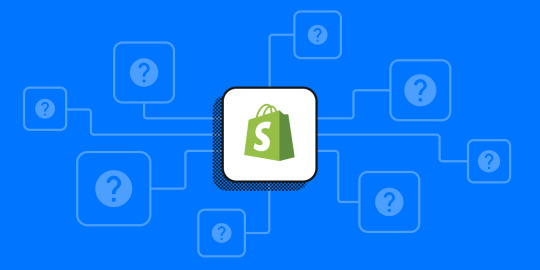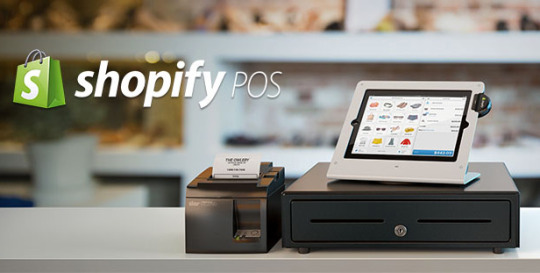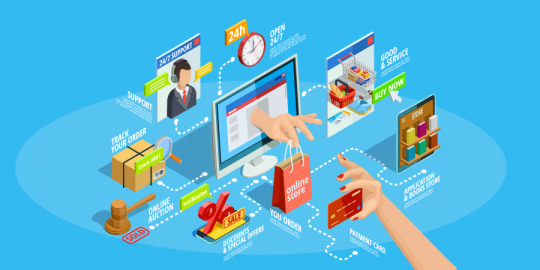Don't wanna be here? Send us removal request.
Text
Must Have Shopify Apps for E-Commerce Startup Store

In the ever-evolving realm of e-commerce, launching a Shopify store is merely the first step toward building a successful online business.
To truly thrive and carve out a niche in the competitive market, integrating essential Shopify apps is paramount.
These applications serve to enhance various aspects of your store, from improving customer experiences to streamlining operations and boosting sales.
Whether you're just starting out or looking to optimize your existing Shopify presence, here's a comprehensive guide to must-have Shopify apps for your e-commerce startup:
1) SEO Enhancement Apps
Search engine optimization (SEO) is the cornerstone of online visibility and organic traffic generation.
Dedicated SEO apps such as SEO Image Optimizer and Plug in SEO are invaluable for optimizing product pages, meta tags, and content to improve search engine rankings.
Additionally, apps like SEO Manager and Smart SEO offer advanced features and insights to streamline the optimization process and enhance your store's visibility in search results.
2) SEO Enhancement Apps
Search engine optimization (SEO) is the cornerstone of online visibility and organic traffic generation.
Dedicated SEO apps such as SEO Image Optimizer and Plug in SEO are invaluable for optimizing product pages, meta tags, and content to improve search engine rankings.
Additionally, apps like SEO Manager and Smart SEO offer advanced features and insights to streamline the optimization process and enhance your store's visibility in search results.
3) Social Proof and Reviews Management
Building trust and credibility with your audience is essential for driving conversions and fostering long-term relationships.
Social proof and reviews management apps like Yotpo and Judge.me enable you to collect and showcase authentic customer reviews and testimonials on your product pages.
These apps not only enhance credibility but also influence purchasing decisions and increase customer engagement.
4) Email Marketing Solutions
Despite the emergence of new marketing channels, email remains a powerful tool for engaging with your audience and driving sales.
Integrating robust email marketing apps such as Klaviyo and Omnisend allows you to create targeted, personalized campaigns that resonate with your subscribers.
With features like advanced segmentation, automation, and analytics, these apps empower you to maximize the effectiveness of your email marketing efforts.
5) Cart Recovery Tools
Cart abandonment is a common challenge for e-commerce businesses, but it also presents a significant opportunity for recovery.
Cart recovery tools like CartHook and Recart help you reclaim lost sales by implementing automated follow-up strategies via email, SMS, and push notifications. These apps leverage incentives and exit-intent popups to encourage customers to complete their purchase and reduce cart abandonment rates.
6) Upselling and Cross-Selling Solutions
Increasing the average order value is key to maximizing revenue and profitability.
Upselling and cross-selling apps such as Bold Upsell and ReConvert seamlessly integrate into your checkout process, allowing you to recommend relevant products and upgrade options to customers.
By strategically presenting additional purchase opportunities, these apps drive incremental sales and boost your bottom line.
7) Live Chat and Support Integration
Providing exceptional customer support is essential for building trust and loyalty with your audience.
Live chat apps like Tidio and Gorgias enable real-time assistance, allowing you to address customer queries and resolve issues promptly.
Additionally, comprehensive support integration apps like HelpCenter and Zendesk streamline ticketing systems and knowledge bases, ensuring efficient query resolution and enhancing the overall customer experience.
8) Social Media Integration Tools
Social media plays a vital role in e-commerce marketing and customer engagement.
Integration apps like Socialphotos and SocialShopWave facilitate the seamless integration of user-generated content and social feeds into your store.
By leveraging social proof and encouraging social sharing, these tools amplify brand awareness, drive traffic, and stimulate sales from social channels.
In conclusion, integrating the right combination of Shopify apps is essential for unlocking the full potential of your e-commerce startup.
From enhancing SEO and email marketing to optimizing conversions and customer support, these apps play a pivotal role in driving growth and fostering brand loyalty.
However, to ensure seamless integration and customization, partnering with a reputable Shopify development service is highly recommended.
With the right tools and expertise, your e-commerce startup can thrive in the competitive digital landscape and achieve sustainable success.
0 notes
Text
A Detailed Guide On Shopify POS: Everything You Need To Know
In the bustling world of retail, having a robust and efficient Point of Sale (POS) system is like having a trusty sidekick – it's essential for smooth operations and happy customers.
Enter Shopify POS, the superhero of retail management solutions! Whether you're running a brick-and-mortar store, pop-up shop, or mobile business, Shopify POS has got your back.
In this detailed guide, we'll dive deep into everything you need to know about Shopify POS, from its features and benefits to tips for maximizing its potential. So, grab your cape, and let's embark on this POS adventure!
What is Shopify POS?

First things first, let's start with the basics. Shopify POS is a powerful point of sale system that allows merchants to sell products and accept payments in-person, seamlessly integrated with their online Shopify store.
It combines the convenience of online selling with the tactile experience of face-to-face transactions, offering a unified platform for managing all aspects of your retail business.
Key Features of Shopify POS
Shopify POS comes packed with a plethora of features designed to streamline your retail operations and enhance the shopping experience for your customers.
Here are some key features to look out for
Unified Inventory Management
With Shopify POS, your online and in-store inventory are seamlessly synced, ensuring that you never oversell products or run out of stock.
Customizable Checkout
Tailor your checkout process to suit your business needs, whether you're offering discounts, accepting multiple payment methods, or capturing customer information.
Integrated Payments
Accept a variety of payment methods, including credit cards, debit cards, cash, and mobile payments, all from within the Shopify POS app.
Customer Profiles
Easily access customer information and purchase history to provide personalized service and drive repeat business.
Sales Reporting and Analytics
Track sales performance, monitor inventory levels, and gain valuable insights into your business with comprehensive reporting and analytics tools.
Offline Mode
Stay in business even when the internet goes down with Shopify POS's offline mode, allowing you to continue processing transactions and capturing customer data.
Benefits of Shopify POS
Now that we've covered the features, let's explore the benefits of using Shopify POS for your retail business:
Seamless Integration
Shopify POS seamlessly integrates with your online Shopify store, providing a unified platform for managing all aspects of your business, from inventory management to order fulfillment.
Increased Efficiency
By streamlining your retail operations and eliminating manual processes, Shopify POS helps you save time and reduce errors, allowing you to focus on growing your business.
Improved Customer Experience
With access to customer profiles and purchase history, you can provide personalized service and recommendations, enhancing the shopping experience and driving customer loyalty.
Real-Time Insights
Gain valuable insights into your business performance with real-time reporting and analytics, allowing you to make informed decisions and optimize your operations for success.
Flexibility and Mobility
Whether you're running a brick-and-mortar store, pop-up shop, or mobile business, Shopify POS offers the flexibility and mobility to sell anywhere, anytime, on any device.
Tips for Maximizing Your Shopify POS Experience
Now that you're familiar with the ins and outs of Shopify POS, here are some tips for maximizing its potential:
Customize Your Settings
Take advantage of Shopify POS's customizable settings to tailor the system to your business needs, including setting up taxes, discounts, and payment methods.
Train Your Staff
Ensure that your staff are properly trained on how to use Shopify POS to maximize efficiency and provide excellent customer service.
Leverage Integrated Apps
Explore Shopify's app store for integrated apps that can enhance the functionality of your POS system, from loyalty programs to inventory management tools.
Stay Up-to-Date
Keep an eye out for updates and new features released by Shopify, as they are continually improving and enhancing the POS system to better serve merchants.
Partner with a shopify expert developer to customize your POS system and provide ongoing support and maintenance for your retail operations.
In conclusion,
Shopify POS is a powerful retail management solution that offers a wide range of features and benefits for merchants of all sizes.
By leveraging its capabilities and following these tips, you can streamline your operations, enhance the shopping experience for your customers, and take your retail business to new heights of success.
So, suit up, and let Shopify POS be your trusted sidekick in the exciting world of retail.
0 notes
Text
How Can You Scale Your eCommerce Business With Shopify?

Are you ready to take your online store to new heights? With Shopify by your side, scaling your e-commerce business has never been easier!
In this guide, we'll walk you through the process of expanding your business and reaching new heights of success. So, let's dive in and discover how to scale your e-commerce business with Shopify!
1. Optimize Your Store for Growth
Before you can scale your business, it's essential to ensure that your online store is ready for growth. Start by reviewing your website's design and functionality.
Is it user-friendly? Does it load quickly? Are your products easy to find? Make any necessary improvements to ensure that your store is optimized for a seamless shopping experience.
2. Expand Your Product Catalog
One of the keys to scaling your e-commerce business is to expand your product catalog. Consider adding new products or expanding your existing product lines to attract a wider audience.
Shopify makes it easy to manage your inventory and add new products to your store, so don't be afraid to experiment and diversify your offerings.
3. Reach New Customers
To scale your business, you'll need to reach new customers and expand your customer base. Utilize Shopify's marketing tools and integrations to attract attention to your store and drive traffic.
Consider investing in paid advertising, social media marketing, and email campaigns to reach potential customers and encourage them to visit your store.
4. Provide Excellent Customer Service:
Happy customers are the foundation of a successful e-commerce business.
Provide excellent customer service to ensure that your customers have a positive shopping experience and keep coming back for more.
Respond promptly to inquiries, address any issues or concerns, and go above and beyond to exceed your customers' expectations.
5. Optimize Your Operations
As your business grows, it's essential to optimize your operations to keep up with increased demand.
Streamline your processes, automate repetitive tasks, and invest in tools and technology that can help you scale more efficiently.
Shopify offers a range of apps and integrations that can help you manage your operations and streamline your workflow.
6. Track Your Progress
Keep track of your progress as you scale your business with Shopify's built-in analytics and reporting tools.
Monitor key metrics such as sales, traffic, and customer engagement to track your growth and identify areas for improvement.
Use this data to make informed decisions and adjust your strategy as needed to continue scaling successfully.
7. Partner with Shopify Development Company
Consider partnering with a Shopify development company to help you navigate the complexities of scaling your e-commerce business.
A Shopify development company can provide expert guidance, technical support, and customized solutions to help you achieve your business goals and overcome any challenges along the way.
By following these steps and leveraging the power of Shopify, you can scale your e-commerce business and achieve new levels of success.
So, roll up your sleeves, get ready to grow, and watch your business soar with Shopify by your side.
2 notes
·
View notes